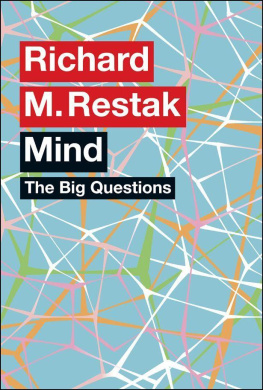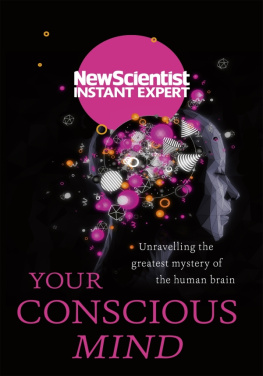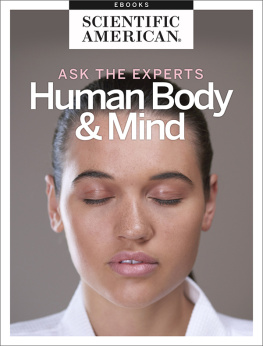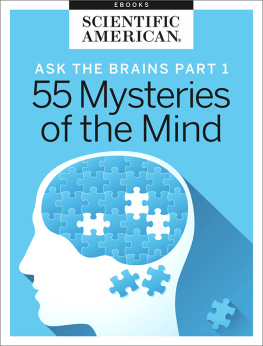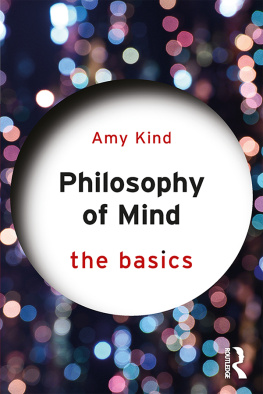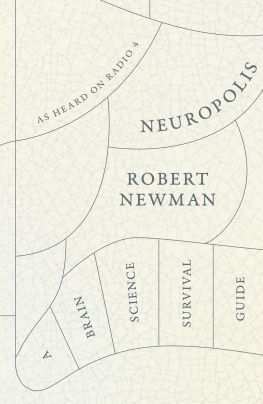THE BIG QUESTIONS
Mind
Richard M. Restak
SERIES EDITOR
Simon Blackburn

Quercus
55 Baker Street
7th Floor, South Block
London,
W1U 8EW
First published in 2012
Copyright 2012 Richard M. Restak
The moral right of Richard M. Restak to be identified as the author of this work has been asserted in accordance with the Copyright, Design and Patents Act, 1988.
All rights reserved. No part of this publication may be reproduced, stored in a retrieval system, or transmitted in any form or by any means, electronic, mechanical, photocopying, recording, or otherwise, without the prior permission in writing of the copyright owner and publisher.
The picture credits constitute an extension to this copyright notice.
Every effort has been made to contact copyright holders. However, the publishers will be glad to rectify in future editions any inadvertent omissions brought to their attention.
Quercus Editions Ltd hereby exclude all liability to the extent permitted by law for any errors or omissions in this book and for any loss, damage or expense (whether direct or indirect) suffered by a third party relying on any information contained in this book.
A catalogue record of this book is available from the British Library
eBook ISBN 978 1 78087 567 5
UK and associated territories:
Print ISBN 978 1 78087 035 9
Canada: Print ISBN 978 1 84866 206 3
Design and illustrations in by Patrick Nugent
You can find this and many other great books at:
www.quercusbooks.co.uk
THE BIG QUESTIONS
Mind
Richard M. Restak is a practising neurologist and former president of the American Neuropsychiatric Association.
Author of nearly 20 books, including several New York Times bestsellers, he has received widespread acclaim for his incisive and accessible treatment of this complex topic. He is currently Clinical Professor of Neurology at George Washington Hospital University, and maintains a private practice in in neurology and neuropsychiatry in Washington, DC.
The Big Questions confronts the fundamental problems of science and philosophy that have perplexed enquiring minds throughout history, and provides and explains the answers of our greatest thinkers. This ambitious series is a unique, accessible and concise distillation of humanitys best ideas.
Series editor Simon Blackburn is Professor of Philosophy at the University of Cambridge, Research Professor of Philosophy at the University of North Carolina and one of the most distinguished philosophers of our day.
Titles in The Big Questions series include:
PHILOSOPHY
PHYSICS
THE UNIVERSE
MATHEMATICS
GOD
EVOLUTION
MIND
ETHICS
Contents
Are we creatures of pure thought?The development of the human brainAchieving the highest levels of brain performanceSeeing things as we areProblems of identity and awarenessLooking under the hoodThe secrets of body languageThe quintessential identity problemDoes our brain already know what were going to do?Putting our minds to workThe pleasures and perils of mind wanderingThe dangers of multitasking and thought suppressionWhat do we know and how do we know that we know it?Processing the past and the futureSeeing ourselves in othersAddiction, pure sex, evolutionary necessity or a beautiful relationship?Fury and the frontal lobesRandom noise or vital insight into the unconscious?Illusion, reality and the mindThinking in new and different ways
INTRODUCTION
The mind what it is, how it works has long exerted a fascination, and dedicated thinkers since the early philosophers have wracked their brains over it. In fact, therein lies an enduring Big Question. Is the brain the same as the mind? And following on from that, if we cannot look at our mind or our brain without employing them as instruments of our exploration do we risk invalidating our investigation? The paradox of self-reference hovers over attempts to understand the mind.
There are other ways of formulating this paradox, but at the core of it is a question about identity, a sense of an I. In the history of thought, the mind has, along with the brain and the soul, formed a triad of ways to understand the essence of a person. Once of vital importance to philosophers, the soul is now largely the province of theology and religion; the brain, by contrast, has entered common parlance comparatively recently, while mind endures in both everyday language (keep it in mind, mind your manners, hes losing his mind) and remains suggestive of higher purposes reflection, intellect, imagination. Philosophers and anatomists witness Descartes or Leonardo da Vinci could, if not always accurately, attempt to delineate connections between motor functions, the senses and the brain. On the other hand, there is not much poetry associated with the brain and a very great deal with the mind.
Today, with the advance of science, the brain edges into the limelight, its status enhanced as new discoveries about its structures and operations emerge. Computer science suggests a metaphor, whereby the brain may be the hardware and the mind its software. Reducing the metaphor to its simplest form produces an equation: mind = all the things a brain does.
While I too have made such claims in several of my earlier books, Im now less certain of that equivalence. For one thing, the word mind can be a collective attitude or Zeitgeist, as in the mind of a nation. Further insights into this mind-writ-large view have been achieved thanks to technology. The Internet now makes it possible to gather real-time data on the activity patterns and verbal and written expressions of millions of people, confirming that a person may have a different mind to say or do something when part of a group than when in isolation. This is one of the reasons behavioural predictions, about individuals or groups, are so difficult to make. Sometimes collective actions both positive and negative may be unimaginable to the individual minds comprising the group. It is difficult to account for this solely in terms of brain activity and neuroscience in its present form.
In addressing Big Questions about the mind, the sense of self-referentiality is never far from the surface. We cannot ask What is thinking? without thinking about it. We cannot ponder What is knowledge without reflecting on the thought processes that we use in order to acquire much of our knowledge. However, in tackling such questions there is a choice: whether to regard it as primarily a philosophical enquiry, or whether it is a scientific enquiry. My approach is to tend towards the latter. In the 21st century few would argue that memories and emotions, words and ideas, dreams and imagination, perceptions and thoughts, and a sense of self and of the outside world are not activities of the brain. We often recognise this most clearly in their absence, by what we see when there are interferences with the normal workings of the brain. And today we are not simply relying on our own self-referring minds to consider these issues brain imaging, cognitive studies, precise anatomical studies, chemistry and many other investigative modes are playing a role. To put it another way, while, philosophically, the self-referential paradox remains, there are practical ways in which we can step outside of ourselves to help tackle the Big Questions.
In approaching the questions posed in the chapters that follow, I have not aimed at definitive answers; in many instances there are no single answers. I have sometimes taken an authors privilege of emphasizing answers that I personally favour, but in doing so I dont expect that my responses will meet with universal agreement. My purpose is to entice the reader to assume an active role in exploring and thinking to use my responses as a spur to coming up with their own responses to the 20 Big Questions. If Ive achieved my purpose, readers will be persuaded to assume the role of good jurors who, after examining the evidence, reach their own conclusions, while retaining full awareness that other people might come to different conclusions.
Next page
